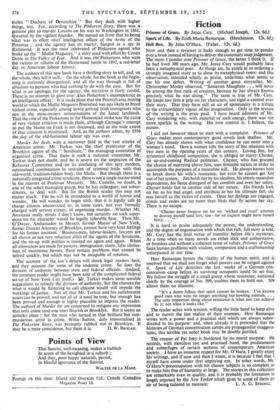Fiction
Now and then a reviewer is lucky enough to get time to ponder over a book instead of having to deliver the customary snap judgement. The more I ponder over Prisoner of Grace, the better I think it. If he had lived 300 years ago, Mr. Joyce Cary would probably have been a metaphysical poet. As things are, he excels at so ordering a strongly imagined story as to show its metaphysical roots: and this observation, intended wholly as praise, underlines what seems to me his one defect. Writing of another great storyteller, Mr, Christopher Morley observed, "Somerset Maugham . . . will never be among the first rank of creators, because he has always known precisely what he was doing." The same is true of Mr. Cary. He keeps too firm a grip on his characters, too rigid a control over their story. That they have still an air of spontaneity is a tribute to the extraordinary vigour of his imagination. Only in the texture of the writing is the price paid. I have heard admirers of Mr. Cary wondering why, with material of such energy, there was not more sparkle in the writing. His iron control is, I believe, the reason.
I did not however mean to start with a complaint. Prisoner of Grace makes most contemporary good novels look shallow. Mr. Cary has already shown with what confidence he can enter into a woman's mind. Here a woman tells the story of her relations with two men in the opening years of this century. Loving Jim, her tyrannical childhood companion, she is obliged to many Chester, an up-and-coming Radical politician. Chester, who has grasped the chance of marrying above him, uses feminine tactics in order to accomplish the purposes of a masculine will. He always knows how to break down his wife's resistance, but even he cannot get Jim out of her system. Jim holds her by his idealism, his utterly masculine dependence, his fierce disregard of her comfort and even her safety. Chester holds fast to another side of her nature. His friends look on her as his bad angel, and attribute to her his ultimate fall; she sees herself as the victim of eyents. Once her feelings are engaged, creeds and codes are no more than birds that fly across her sky. There is no escape.
"Chester never forgave me for my 'wicked and cruel' attempt to destroy myself (and him, too—for an incluest might have ruined him); . . ."
It is hard to praise adequately the power, the understanding, and the degree of organisation with which this rich, full story is told. Mr. Cary has the final virtue of humility before life's mysteries. At a time when so many novels are either slick and authoritative, or formless and without a coherent sense of values, Prisoner of Grace faces human problems with wisdom, compassion and a craftsmanship unsurpassed in our time.
Herr Remarque hymns the vitality of the human spirit, and is resolved that we shall not forget what powers can be ranged- against it. Spark of Life describes the last weeks of a German con- centration camp before its surviving occupants could be set free. We follow the struggle of a small group whose resistance, sustained chiefly by the courage of No. 509, enables them to hold out. 509 allows them no illusions.
"It's a damn fallacy that spirit cannot be broken. I've known good men who were no longer anything but howling animals. . . . The only important thing about resistance is what one can achieve by it; not what it looks like."
The reader aches with tension, willing the little band to keep alive and to outwit the last malice of their enemies. Herr Remarque writes with a power and a practiCal skill which are always subor- dinated to his purpose: and, when already it is pretended that the histories of German concentration camps are propagandist exaggera- tions, this terrible yet sober book may be doubly justified.
The creator of Pal Joey is burdened by no moral purpose. He records, with merciless eye and practised hand, the predicaments and subterfuges of certain sections of contemporary American society. I have an immense respect for Mr. O'Hara, I greatly enjoy his writings, and if now and then I wince, it is because I feel that I myself have come under that unpitying eye. In other words, Mr. O'Hara's preoccupation with his chosen subjects is so complete as to make him free of humanity at large. The stories in this collection are remarkably even in quality, and it is probably the limitation in length imposed by the New Yorker which gives to some of them an air of being tailored to measure. L. A. G. STRONG.


































 Previous page
Previous page